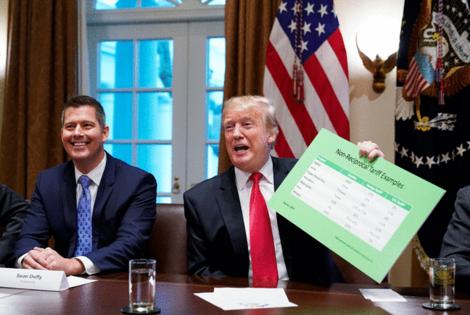Daniel Howes: Why Trump's tariff orthodoxy won't change auto reality
Published in Business News
DETROIT — In a company town that’s seen more than its share of economic hardship, President Donald Trump’s Tariffpalooza could get ugly for Detroit real fast.
It's a presidential choice, marked Thursday by plunging stock markets around the world not seen since the outbreak of COVID-19. Just hours after Trump unveiled import taxes against pretty much the whole world the day before, Stellantis NV moved to idle its minivan plant in Windsor and followed that up with production halts in Michigan and Mexico. Ford Motor Co. is offering A-Plan employee pricing dubbed “From America, for America” to move its metal.
Mercedes-Benz and Sweden's Chinese-owned automaker, Volvo, are reported to be mulling production expansions in the United States lest tariffs price them out of the rich U.S. market. And General Motors Co. is poised to add shifts in at least one assembly plant in Indiana, presumably an effort shared by others, foreign and domestic, to engender goodwill with the Trump White House.
But would it? Trump’s Liberation Day performance in the Rose Garden on Wednesday revealed a president firmly committed to his decades-long belief in the power of tariffs, despite the conclusions of economists, investors, business leaders and the verdict of history — especially that of the 1930s. That's when the era of Big Tariffs helped spawn the era of Big Power nationalism and global war that claimed 60 million lives and laid the predicate for the American Century.
Those simple historical facts can be dismissed easily as inconvenient, irrelevant or both. But they don't change how the arc of tariffs affects major economies, even today, especially modern ones interconnected by global supply chains, digital technology and comparative advantage, namely how a country can produce something more cheaply than rivals.
With apologies to Santayana, those who don’t care to know history are doomed to repeat it: “The tariffs are a debacle of epic proportions for the auto industry and U.S. consumers as the concept of a U.S. car with all U.S. parts is a fairy tale fictional narrative," Dan Ives, an analyst with Wedbush Securities Inc., wrote in a note Thursday. “The winner in our view of this tariff is no one.”
The losers include Detroit's automakers, their investors and their hourly members of the United Auto Workers who can say goodbye to their record, five-figure profit-sharing checks as tariffs on vehicles built in Mexico and Canada sap the operating profit — all while their union president, Shawn Fain, trades union support for a years-in-the-making promise of more jobs from the most transactional president in U.S. history.
As China's largely state-backed auto industry extends its reach into most developing markets save the United States and drives costs down, down, down, Trump and Fain are coalescing around the losing idea that costs can go up, up, up because the rest of the world can be forced to pay for it.
If only the real world were that tidy and organized. But it isn't. True tariff believers on Team Trump insist their stunning policy shift will force foreign (and domestic companies like, say, Detroit's automakers) to make multibillion-dollar capital investments in the United States to skirt tariffs and reach the commercial promised land.
"Relocating production and hiring more workers may take years to play out," Deutsche Bank said in a research note Thursday. "We expect the automakers to potentially make big announcements related to onshoring in order to gain goodwill with the administration. Will these ultimately lead to massive" capital investment "and hiring cycles? Maybe."
Some will, and already have, fast-track deals incentivized more by, say, the Biden-era Chips and Science Act than the tariff hammer. Others will offer symbolic investments already in the works, but fall short of making billion-dollar investments that wouldn't see Job One until Trump's time in office ends.
The plays envisioned by Trump take years to materialize, to employ U.S. citizens, to realize the president's goal of rekindling the heyday of American manufacturing, epitomized by Detroit's Golden Age in the 1950s. Case in point: Stellantis is repurposing its plant in Belvidere, Illinois. What is the timeline for its assembly line to restart? Two years.
The global auto industry is rife with such examples: The pain induced by Trump's tariff policy is immediate. Relief, however, is further away, complicated by a corporate decision matrix balancing capital allocation, consumer demand, investor expectations and profit margins.
Impact is being felt already. Dealerships report customers flocking to showrooms to beat tariff price increases; assembly line shifts are being added or dropped; vehicle inventories swelled before the tariff deadline, and will begin to sell down; and come the end of the month, automakers will be forced to publicly reckon with the financial implications of Tariffpalooza.
That's when first-quarter earnings reports will be released, most likely requiring the automakers to detail the material, financial implications of Trump's new tariff normal. Layoffs? Production cuts? Profit warnings? Hourly profit-sharing and white-collar bonuses imperiled?
Yup. All are possible save the impossible: namely, that the impact of Trump's tariffs will be zero on an industry he says he supports. Buckle up, Detroit.
____
©2025 www.detroitnews.com. Visit at detroitnews.com. Distributed by Tribune Content Agency, LLC.












Comments